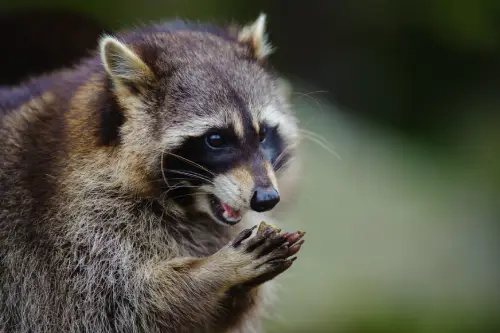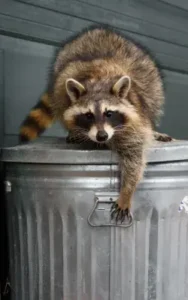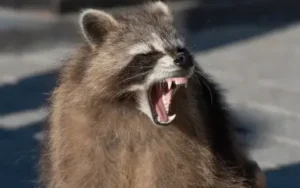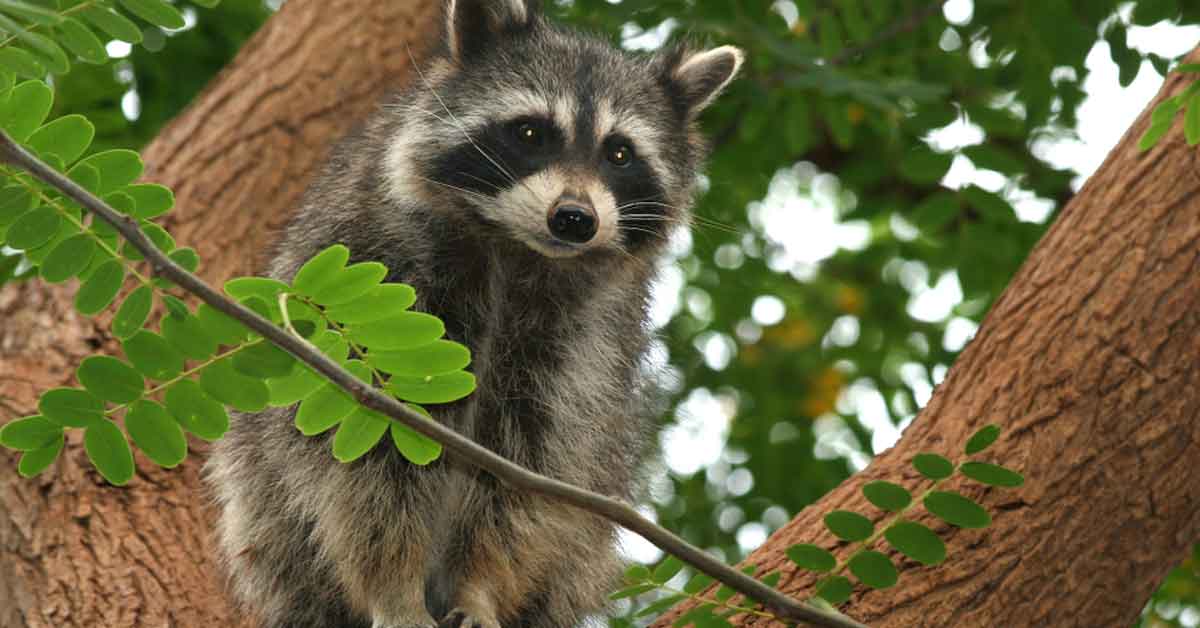Raccoons are clever troublemakers in nature. However, they can turn into pests in neighborhoods. If you’re dealing with raccoons in your neighborhood, you likely have questions. Twin Forks Pest Control® has answers.
Here are the seven most common questions our wildlife experts get about raccoons. We’ll start with super-quick answers to these questions, then move on to more detailed answers.
To jump down to an in-depth answer to any of these questions, just click the link:
- Are raccoons rodents? No, they’re procyonids.
- Do raccoons have thumbs? No, but they have remarkable dexterity in their paws.
- Why do raccoons touch everything?They use their paws like a second set of eyes.
- What do raccoons do during the day? Most raccoons sleep during the day; if you happen to see one during the day, be cautious.
- Are raccoons dangerous? In most cases, no. But they can be if you get too close.
- How are raccoons dangerous? Raccoons have sharp teeth and claws, and carry diseases.
- Do raccoons eat cats? Yes, they can. But they don’t hunt cats for prey.
- What can I do about raccoon problems? Do everything you can to eliminate their access to food, water, and shelter.

FAQs About Raccoons
Now let’s dive deeper into the answers to the most common FAQs about raccoons. If you don’t find the answer you’re looking for here, don’t hesitate to reach out to us!
Are raccoons rodents?
Raccoons may resemble large rodents, so some people think they are. However, they actually belong to the procyonid genus. Their closest relatives are animals like the olingo, kinkajou, and coati. These animals mainly live in South America.
They are the only procyonids in the U.S., except for the ring-tailed cat, found in the Southwest. They are not closely related to cats or dogs. Instead, they share a common ancestor with bears. They’re only distantly related to cats and dogs, and share a common evolutionary ancestor with bears.
Endlessly adaptive, raccoons are among the more intelligent mammal species. Raccoons easily figure out how to open garbage bins and unfasten latches. Because of this, it’s crucial to keep your bins secured if raccoons are nearby.
Do raccoons have thumbs?

It’s a common misconception that raccoons have opposable thumbs. They don’t, but they do have remarkable dexterity in their front and back paws. They can grip and handle items well. This makes them great foragers and trash can raiders. Their highly sensitive paws also allow them to feel out objects in the dark as if they have a second set of eyes.
Why do raccoons touch everything?
Raccoons are active at night. Their sharp night vision is a big help. Plus, they have sensitive nerves in their paws. This is why they tend to touch everything – they’re essentially using their paws as a second set of eyes. This helps them find food sources, even in the most challenging environments.
What do raccoons do during the day?
Most raccoons sleep during the day in dens built near food sources. Sometimes, female raccoons scavenge in the daytime. They do this to feed their young or find better shelter if needed.
If you see a raccoon behaving strangely during the daytime, do not approach it, as it may be sick and potentially with rabies. Potential signs of rabies in a raccoon include stumbling, lethargy, disheveled appearance, and approaching people without fear. Never approach a raccoon (or any animal exhibiting these signs) as rabies is fatal in humans.
Are raccoons dangerous?
Raccoons can be dangerous if you get too close. The key is keeping a safe distance and never trying to handle a raccoon. They are surprisingly strong for their size. They have sharp teeth and claws. If they feel threatened, they might attack humans or pets.
How are raccoons dangerous?
Raccoons can carry diseases like rabies, distemper, and parvovirus. These can spread to humans and pets through bites and bodily fluids. Make sure to vaccinate your pets against distemper and parvo. This is important if they go outside and if raccoons are nearby. Raccoons also carry roundworm, which is transmitted via raccoon feces.
Make sure you can recognize the signs of rabies in raccoons. They are key carriers of the disease in our area, and it can be fatal:
- Unusual daytime activity: Raccoons are normally nocturnal, so seeing them active during the day is a major red flag.
- Aggressive or fearless behavior: Approaching humans or pets without fear, acting hostile or attacking unprovoked.
- Disorientation and confusion: Walking in circles, appearing dazed, or moving erratically.
- Difficulty walking: Stumbling, paralysis in hind legs, or unsteady gait.
- Excessive drooling: Foaming at the mouth or inability to swallow properly.
- Vocalizations: Unusual sounds like chattering, screeching, or growling.
- Self-mutilation: Biting or clawing at themselves.

Do raccoons eat cats?
Yes, they can, especially small cats and kittens. However, they don’t usually go out of their way to hunt cats. Raccoons are opportunistic feeders and will gladly eat any dead meat they find.
While not typically predators of cats or small dogs, raccoons are fiercely protective of their young and territory. If they feel threatened, they will fight back, which can lead to severe injury or even death for pets.
What can I do about raccoons?
The best way to deal with problem raccoons is to avoid attracting them in the first place. Raccoons are opportunists and will take advantage of any food or shelter you give them access to. Therefore, the best ways to prevent raccoons on your property are centered around depriving them of access to food, water, and shelter:
- Secure trash cans with locks or bungee cords.
- Repair holes in sheds, decks, and foundations.
- Don’t feed your pets outdoors, but if you must, don’t leave the food or water out overnight when raccoons are active.
- Harvest ripe fruits/vegetables promptly.
- Clean up fallen birdseed.
- Call a professional raccoon control and exclusion expert if needed.
Trust Twin Forks Pest Control® for Raccoon Control
You may think you can handle your raccoon problem on your own. Sometimes you can, but sometimes you need a professional raccoon trapper. A raccoon control professional knows how to do it safely, legally, and humanely.
We do not advise DIY raccoon trapping because it can be dangerous without the proper knowledge, and in many areas, it’s illegal. Also, try to avoid scaring or harassing raccoons. This can make them more aggressive, it’s unlikely to scare them away long-term, and it may be illegal.
Twin Forks Pest Control® has been helping local Southold and Southampton residents with wildlife control and exclusion for 14 years. We have extensive experience helping our neighbors with raccoon issues, offering fast solutions and long-term peace of mind.
If you’re tired of freeloading raccoons scavenging off your property, there’s an easy answer. Twin Forks Pest Control® is here to help. At the first sign of problems, call us for a free estimate!

